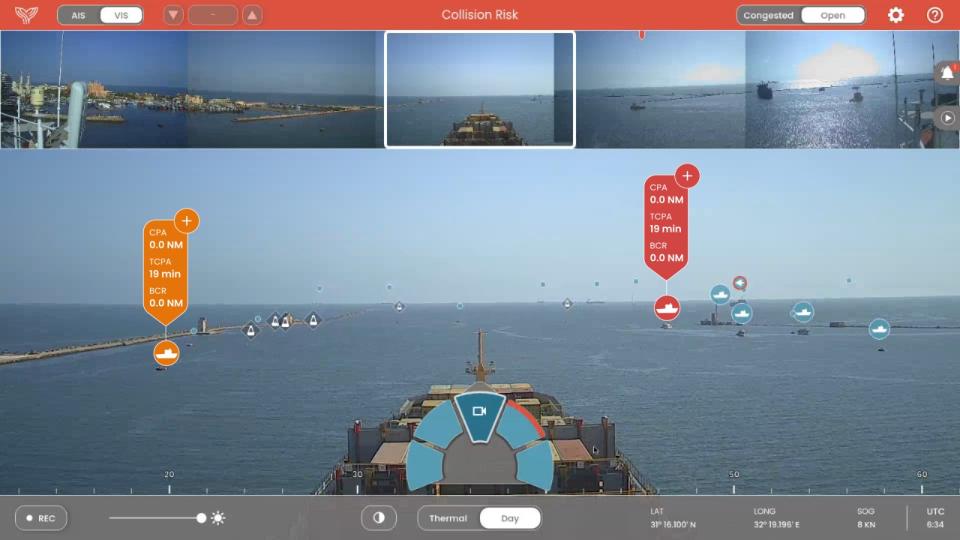Autonomous shipping startup Orca AI tops up with $23M led by OCV Partners and MizMaa Ventures

If you thought autonomous driving was just for cars, think again. The "autonomous navigation" market -- where ships steer themselves guided by AI, resulting in fuel and time savings -- is projected to grow from $4.46 billion in 2023 to $5.33 billion in 2024 alone.
Orca AI is a London-based startup that claims to have powered the world’s first autonomous commercial ship voyage in congested waters. It’s now added $23 million in fresh funding, led by OCV Partners and MizMaa Ventures. The funding, which we're told is between a Series A and Series B, takes its total raised to nearly $40 million.
The startup was founded at the end of 2018 and went on to launch its AI navigation tech commercially in 2021 -- when it also raised a $13 million Series A. The latest funding injection will be used for scaling and expansion, the company told TechCrunch, and to invest in building new products -- drawing on data the platform is ingesting from clients. Expanding its engineering team is also in the cards.
Founded by Israeli naval technology experts Yarden Gross and Dor Raviv, Orca AI processes multiple sources of visual information during navigation at sea, keeping the ship on course and freeing up the crew to monitor other aspects of the voyage, such as drone attacks and piracy, which are occurring in increasingly unstable geopolitical times.
Citing results from a 2023 trial, Orca claims its system is so accurate it was able to reduce "close encounters in open waters" by 33% and "crossing events" by 40% across 15 million nautical miles. (For some context, there were over 2,500 significant marine incidents in 2022, according to a European Maritime Safety Agency report.)
It also claims the system can yield $100,000 to $300,000 in fuel savings per vessel per year (reducing fuel consumption by 3% to 5%). Additionally, Orca AI suggests its tech achieved a CO2 reduction of 72,716 tons across 1,000 vessels last year.
Shipping is under pressure to reduce its carbon footprint -- creating opportunities for entrepreneurs to digitize the industry and apply technologies like AI to boost efficiency.
What can be harsh and dangerous working conditions for sailors, with a growing range of threats affecting global shipping routes, are also applying pressures to the industry that could drive increasing automation of crew.
Over a call with TechCrunch, Gross, Orca AI's CEO and co-founder, said: “When you talk about oceangoing vessels, we're going to see, in the near future, vessels sailing without any crew. In the meantime, you can optimize and automate many parts of the voyage, reducing workload, reducing also the amount of people. You can optimize fuel consumption emissions [and] the ETA [estimated time of arrival] and increase safety altogether. So this is what we're building. We're building a platform that serves the ship itself.”
Gross said Orca's platform uploads all data to the cloud, providing monitoring tools and capabilities for fleet managers. “It means they can operate not one vessel, but the entire fleet. So you can think about it as an operational platform for a semi-autonomous fleet.”
Commenting in a supporting statement, Hemi Zucker, managing partner at OCV, added: “Maritime transport is the lifeblood of international trade and the global economy. Over 80% of the volume of international trade in goods is carried by sea, a $2 trillion market by some estimates. While planes, trains, and automobiles have seen tremendous progress and investment in regards to autopilot and collision prevention, we believe that the shipping industry is still up for grabs and there is a category defining opportunity in autonomous ships -- ships that captain themselves.”
Orca AI works with global shipping companies, including MSC, NYK, Maersk and Seaspan.
Other companies working on autonomous navigation at sea include Avikus (subsidiary of Hyundai HD) and Sea Machines.

 Yahoo Finance
Yahoo Finance 